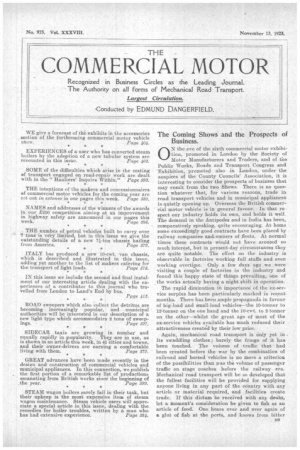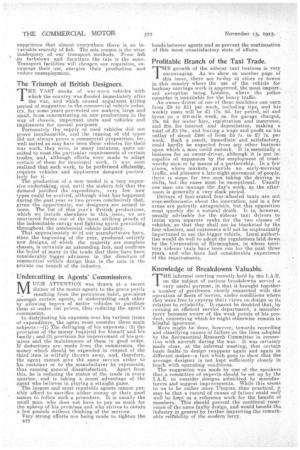The Coming Shows and the Prospects of Business.
Page 1

Page 2

If you've noticed an error in this article please click here to report it so we can fix it.
ON the ,eve of the sixth commercial motor exhibition, promoted in London by the Society of Motor Manufacturers and Traders, and of the Public Works, Roads and Transport Congress and Exhibition, promoted also in , London, under the auspices of the County Councils' Association, it is interesting to consider the prospects of business that may result from the two Shows. There is no question whatever that, for various reasons, trade in road transport vehicles and in municipal appliances is quietly opening up. Overseas the British commercial motor vehicle is in general favour. In that respect our industry holds its own, and holds it well. The demand in the Antipodes and in India has been, comparatively speaking, quite encouraging. At home some exceedingly good contracts have been placed by railway companies and, owners of fleets. At normal times these contracts would not have aroused so much interest, but in present-day circumstances they are quite notable. The effect on the industry is observable in factories working full staffs and even working overtime. • Only a few days ago we were visiting a _couple of factories in the industry and found' this happy state Of things prevailing, one of . the works actually having a night shift in operation. The •rapid diminution in importance of the ex-service surplus has been particularly marked in recent months. There has been ample propaganda in favour of big-load and small-load vehicles—the 10-tonner to 12-tonner on the one hand and the 70-cwt. to 2-tonner on the other—whilst the great age of most of the ex-service vehicles available has much reduced their attractiveness created by their low price.
Again, mechanical road transport is only yet in. its swaddling clothes ; barely the fringe of it has been touched. The volume of traffic that had been created before the war by the combination of railroad and horsed vehicles is no more a criterion of the possibilities than ;was the volume of passenger traffic on stage coaches before the railway era. Mechanical road transport will be so developed that the fullest facilities will be provided for supplying anyone living in any part of the country with any article or material required, and facilities create trade. if this dictum be received with any doubt, let a inoment's consideration be given to fish as an article of food. One hears over and over again of a glut of fish at the ports, and knows from bitter experience that almost everywhere there is an invariable scarcity of fish. The sole reason is the utter inadequacy of our transport methods. From fish -,.to furbelows and furniture the tale is the same. Transport facilities will cheapc.n our requisites, encourage their use, energize their production and reduce unemployment.
The Triumph of British Designers.
THE VAST stocks of war-worn vehicles with which the country was flooded immediately after the war, and which caused anh,alrnost killing period of stagnation in the commercial vehicle industry, for some years prevented our makers' large and small, from concentrating on new productions in the way of chassis, important units and vehicles and implements for special purposes. Fortunately the supply of used vehicles did not prove inexhaustible, and the running of old types did not always prove a commercial proposition, for, well suited as may have been these vehicles for their war work, they were, in many instances, quite unsuited to meet the particular requirements of certain trades, and, although efforts were made to adapt certain of them for municipal work, it was soon realized that such work, to be performed efficiently, requires vehicles and appliances designed particularly for it. The production of a new model is a very expensive undertaking, and, until the makers felt that the demand justified the expenditure, very few new types could be evolved, although what has happened during the past year or two proves conclusively that, given the opportunity, our designers are second to none. The list of this year's British productions, which we include elsewhere in this issue, we are convinced forms one of the most striking proofs of the indomitable energy and fighting spirit prevailing throughout the commercial vehicle industry. That approximately 40 of our manufacturers have, since the beginning • of the year, produced entirely new designs, of which the majority are complete chassis, is certainly an astounding fact, and confirms the belief of many in the trade that there have been considerably bigger advances in the direction of commercial vehicle design than is the case in the private car branch of the industry. .
Undercutting in Agents' Commissions.
MUCH ATTENTION was drawn at a recent dinner of the motor agents to the grave perils resulting froth the pernicious habit, prevalent amongst certain agents, of undercutting each other by allowing buyers oi motor vehicles to purchase them at under list prices, thus reducing the agent's commissien. In distributing his expenses over his various items of expenditure, the agent must consider three main subjects :—(1) The defra,ying of his expenses ; (2) the provision of the money 1-equired for himself and his family ; and (3). provision for improvement of his premises and the maintenance of them in good order. If deductions are made from the commission, the money which should be expended in respect of the third item is wilfully thrown away, arid, therefore, the agent cannot give the same service either to his customer or to the manufacturer he represents, thus causing general dissatisfaction. Apart from this, he is reducing the status of the trade in every quarter, and is taking a meanadvantage of the agent who believes in playing a straight game. The largest and most reputable agents cannot possibly afford to. sacrifice either money or their good names to follow such a procedure. It is usually the small man, who does not have to pay so much for the upkeep of his premises and who strives to obtain a fe* pounds without thinking of the morrow. Very strong efforts are being made to tighten the B10
bonds between agents and so prevent the continuation of this most unsatisfactory state of affairs.
Profitable Branch of the Taxi Trade.
HE growth of the sidecar taxi business is very encouraging. As we show on another page of this issue, there are to-day 41 cities or towns in this country where the use of the vehicle for hackney carriage work is approved, the most import._ ant except-ion being London, where the police consider it unsuitable for the heavy traffic. An owner-driver of one of these machines can earn from 29 to Ell per week, including tips, and his weekly costs will be 21 17s. 6d. for petrol, oil and ,tyres on a 200-mile week, 5s, for garage charges, 10s. 6d. for meter hire, registration and insurance, and 20s, for interest and depreciation, making a total of 23 13s. and leaving a wage and profit on his outlay of about 2200 of from .25 7s. to 27 7s. per week. Such a result, immediate' and satisfactory, could hardly be expected from .any other business upon which a man could embark. It is, essentially a in capable for an owner-driver, although it is not of expansion by the employment of trust worthy men or by means of a partnership. In a few places, where markets provide an early-morning traffic, and pleasure a late-night movement of people, there is scope for two men taking the driving in shifts, but the eases must be exceptional. Usually one man can manage the day's work, as the afternoon is generally a very slack period. " Drivers of four-seated four-wheeled taxis are not over-enthusiastic about the innovation, and in a few areas are patently antagonistic, but this opposition must quickly die a natural death. It is, however, usually advisable for the sidecar taxi drivers to insist upon 'separate ranks_ for the two classes of vehicles, so that they shall not be blanketed by the four-wheelers, and customers will not be unpleasantly importuned to use the bigger vehicle. Local authorities would do well to adopt the regulations laid down by the Corporation of Birmingham, in whose territory sidecar taxis have been run for the past three years, and who have had considerable experience of the requirements.
Knowledge of Breakdowns Valuable.
THE informal meeting recently held by the I.A.E. on the. subject of curious breakdowns served a. . very useful purpose, in that it brought together a number of gentlemen closely connected with the operation of fleets of lorries, under conditions where they were free to express their views on design in its relation to reliability. It cannot he doubted that, by running an efficient serviet department, a manufacturer becomes aware of the weak points of his product, concerning which he might Otherwise remain in blissful ignorance. More might be done, however, towards recording and classifying causes of failure on the lines adopted by the Aeronautical Research Committee in connection with aircraft during the war. It was certainly made clear, at the informal meeting, that certain -basic faults in design reappear again and again in different makes—a fact which goes to show that the average designer is not kept sufficiently closely in touch with operating conditions. The suggestion was made by one of the speakers that a committee of experts should be set up by the I.A.E. to consider ,designs submitted by manufacturers and suggest improvements. While this seems to us to be rather more Utopian than -practical, it may he that a record of causes of failure could very well be kept as a reference work for the benefit of members. This should prevent the continual recurrene'e of the same faulty design, and would benefit the industry in general by further improving the remark. able relfahiTity of the modern lorry.
















































